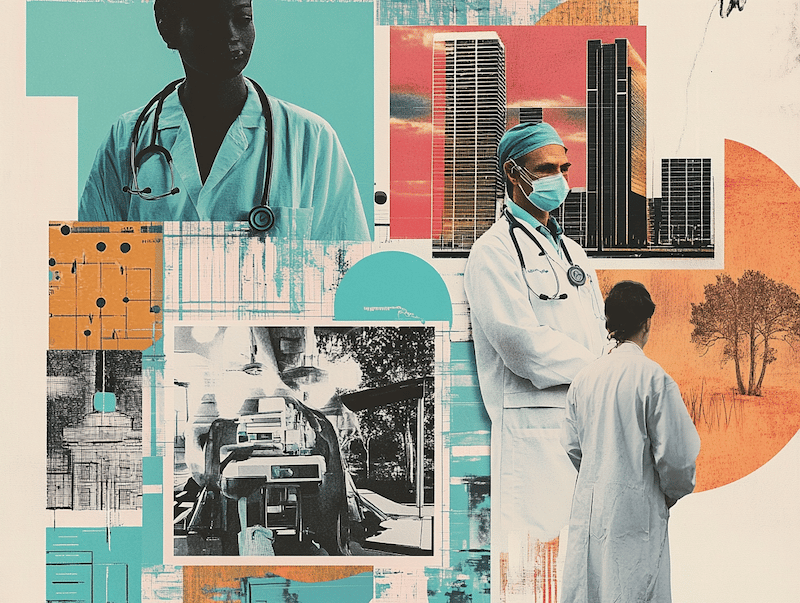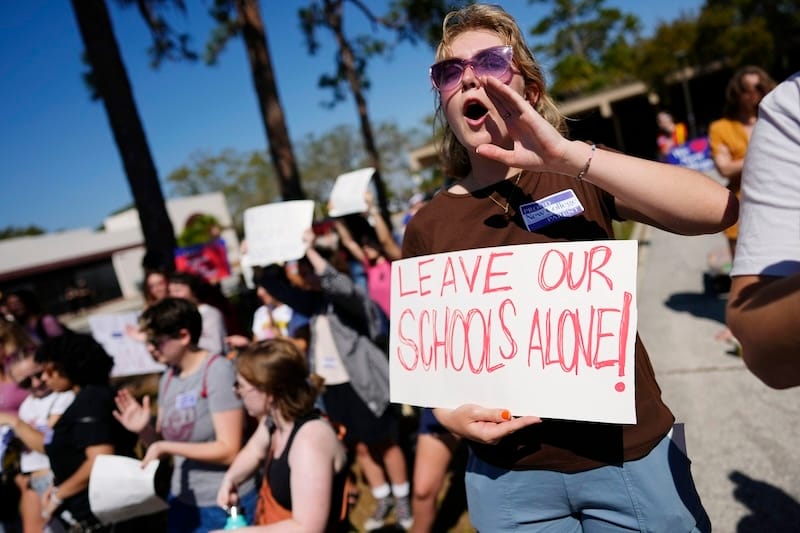- Reimagined (formerly Anti-Racism Daily)
- Posts
- Weekend Edition: On UnitedHealthcare CEO and grieving unjust systems, colleges end DEI programs, and 8 takeaways from the first day of SCOTUS' trans rights case.
Weekend Edition: On UnitedHealthcare CEO and grieving unjust systems, colleges end DEI programs, and 8 takeaways from the first day of SCOTUS' trans rights case.
This edition of Take Care looks at collective grieving as a necessary form of movement work.

December 8, 2024
Weekend Edition: On the death of UnitedHealthcare's CEO and grieving unjust systems, colleges end DEI programs, and 8 takeaways from the first day of SCOTUS' trans rights case.
Forwarded this newsletter? Subscribe here.
Good morning and happy Sunday! I hope you’re finding ways to take care of yourself this month as work deadlines loom, midterms continue, and the holidays ask for more of our attention. In this issue, I’m reflecting on the death of UnitedHealthcare CEO Brian Thompson and how our grief presents itself in the wake of tragedy. I’ve also compiled some interesting reads on care in the “Recommended Reading” section. I hope you enjoy.
We’re revamping Banned Books Book Club – thanks to many of you – in 2025! For now, be sure to sign up for upcoming alerts. This has been such a lovely passion project that I’ve been desperate for more capacity for, and the urgency of the times forced me to get myself together 🥲
Also – thank you so much for supporting DonorsChoose classrooms last week. We raised just shy of another $10,000! If you know of an organization we can partner with to make a greater impact, send us a message here.
This newsletter is made possible because of the support from our readers. Here's how you can help us stay sustainable:
In solidarity,
Nicole
Take Care: Brian Armstrong and grieving inequitable systems.

A collage of imagery of the public healthcare system. Source: Reimagined.
A man was murdered in broad daylight, and the world mocked his death. "The man was murdered? Too bad his health insurance didn't cover that." "$10,000 reward for the whereabouts of the assassin? Sorry, I haven't met my deductible yet." UnitedHealth Group CEO Brian Thompson was fatally shot outside a NYC hotel last week while heading to an investor conference in what police described as a premeditated attack. The assailant shot Thompson multiple times and fled on an electric bike. Thompson was later pronounced dead at Mount Sinai West hospital. As the news broke online, many were quick to post their reactions, many of which were labeled disrespectful and derisive.
Brian Thompson, from what I read online at least, didn't do anything directly to deserve this hate. A quick Google Trends shows that nearly no one was Googling his name before his death, and Thompson had a relatively low digital presence. It's likely that no one was personally affected by something Thompson directly said or did to them but descended upon him because of his role and position of power in the healthcare system – and the annual compensation package of $10.2M that came with it.
And understandably so: our healthcare system is a litany of broken promises and unfulfilled access to care, treating healthcare as a product to sell rather than a basic human right. Most people get their insurance through their jobs, which means their access to care is tied to their employment status. Even with insurance, many face significant barriers like high deductibles, co-pays, and denied coverage for needed treatments. Those without insurance often avoid seeking care until emergencies, leading to worse health outcomes and potentially devastating medical debt.
The results are stark disparities in health outcomes, with poor people and people of color facing worse care and higher mortality rates from treatable conditions. Many Americans face impossible choices between their health and financial stability, with medical debt being a leading cause of bankruptcy. Consider Alec Smith, a 26-year-old who died rationing his $1,300-per-month insulin after aging out of his mother's insurance, or Sarah Burke, whose family had to crowdfund $300,000 in medical bills despite her having both Canadian and U.S. insurance because her ski accident was deemed "high-risk." Unlike other developed nations that guarantee healthcare access to all citizens, our system perpetuates and deepens existing social inequities, allowing preventable suffering and death while generating enormous profits for healthcare corporations.
Enter Thompson's lurid death with intoxicating details (broad daylight! shell casings! the attractive assassin!) attractive to even the most amateur true crime fans, just weeks after the results of an election run by billionaires and days after a conspiracy theorist was chosen to lead the country's Health and Human Services. It created a moment to collectively address what has yet to be explicitly stated – how out of control and overwhelming our health care system is. This response isn't part of a witch hunt but a collective mourning, a way for our uncollected heartbreak and grief to find a home.
Moments like this demonstrate how disconnected inequitable systems make us feel, divorced from our own suffering without anyone to blame. We witness this in the face of tragedy, in the hate volleyed at cops who shoot unarmed Black teenagers, through the love plastered on orcas taking out yachts, and the scorn lobbied against billionaires. We witness it across political ideologies; consider how right-wing leaders label women in defense of reproductive rights as sluts, or use trans legislation to grieve their outdated, harmful stereotypes of gender. These moments are forced upon us rather than chosen, giving us a messy and unexpected time to prepare for grieving; it's akin to being invited to a funeral that's happening right now, and arriving at the venue with no food, the body still being embalmed and florists still creating centerpieces on the tables. We grieve while doomscrolling on TikTok, by launching divisive comments on an online article during the workday, or by retweeting a video we didn't quite watch. The moments are messy and we do what we must, because systemic injustices don't just rob us of our rights but our capacity to grieve how it harms us, as chaotic and random as the violence itself.
It still doesn't justify hate, but it's understandable how our grieving might not look respectful. And who decides the respectability politics we're playing? The individuals harmed, or the systems that enforce them? And who benefits when we tone-police our grief? The individuals that are desperate to be heard and recognized for the unseen violence inflicted upon them, or the well-paid executives unwilling to address their complicity in the harm? If all of this attention is being directed at someone not for who they are but for the role they occupy, we must consider: did the role of the chief executive officer of a major health insurance company garner respect by leading a just and equitable company? Who gets to determine that, and decide whether a response is justified?
By touting Thompson's innocence above those ensnared in the healthcare system, without a $10M salary to help navigate it, we do two things. First, we place the desires of the privileged few above the needs of many, those that have lost their lives waiting for access to care or unable to afford it. Second, it perpetuates the illusion that these systems are nameless, faceless institutions instead of what they really are: organized entities led by the decisions of real people, with real names, and true levels of accountability to their customers. Thompson isn't single-handedly responsible, but he is partially responsible and holds far more accountability than the everyday people victimized by the system. What's more, the role of a CEO comes with being the face of the organization and being held responsible for its actions. Even in death, Thompson's position in the organization deserves public scrutiny – and we can't forget that.
If we're going to hold the mirror to the injustice of the systems, we need to take a hard look at ourselves and challenge what comfort we may choose over the needs of the collective. For all we know, Thompson lost his life trying to do that himself. But in this moment, let us grieve, let us gather, and let us reminisce – because these moments foster the togetherness and the urgency we need to move from heartbreak and leverage our own accountability for collective change. We need to bear witness to the injustices to name them, to claim them, and to reckon with them when it's time – at the ballot, at the protest, when we're choosing our company's next health insurance plans, at the moments where grieving gives way to action.


Conflict Evolution
Tuesday, December 10 | 3pm EST
Tuesday, January 21 | 3pm EST
Go beyond conflict resolution and apply a culturally-responsive, inclusive framework to navigating challenging conversations, mediating tense scenarios, and fostering understanding with opposing viewpoints.

Power + Privilege
Thursday, January 30 | 3pm EST
Learn about how power dynamics and privilege can impact the workplace and perpetuate harmful practices. Gain tangible skills and tools to become a better ally and build a more inclusive and equitable workplace.


New College of Florida students and supporters protest ahead of a meeting by the college's board of trustees on Feb. 28. Across the country, protests over cuts to DEI initiatives in colleges have mounted. Rebecca Blackwell/AP
Colleges shut down diversity programs across the country. Bans are prompting colleges to close up cultural centers and rewrite course catalogs — moves that can interfere with student life and threaten free speech. Axios >
Louisiana organizers fight against fossil fuel injustice. In southwestern Louisiana, organizers fight petrochemical projects amid a legacy of exploitation. Prism >
Related: Black women are leading the fight against polluters in Louisiana — and they're winning. Philanthropic and government investments in environmental justice are helping nonprofits push back against industrial development. Capital B News >
Anti-fatness as anti-Blackness: Violence at home, violence abroad. Fatness, as with Blackness, is always and already criminalized, penalized, objectified, and marginalized. Prism >
New York isn't ready to fight more wildfires. New York could see more frequent and destructive blazes, but the state doesn't have enough forest rangers and firefighters to respond to the growing threat. Grist >
Amnesty International: Israel is committing genocide in Gaza with full U.S. support. Amnesty International has released a landmark report that concludes Israel is committing genocide against Palestinians in Gaza, making it the first major human rights group to do so. Democracy Now >
I’m grateful for a lot of things. But not Thanksgiving. According to native writer Taylar Dawn Stagner, the holiday masks an unsavory reality, but "Un-Thanksgiving" offers something more satisfying. Grist >
8 takeaways from the first day of SCOTUS' historic trans rights case. Key moments from the first day of the case that could determine the future of trans rights in the U.S. them >
How liberal legal frameworks become fodder for fascism. Dima Khalidi of Palestine Legal explains how our legal system's inability to challenge underlying power structures allows for the far right to wield it against our people and our movements. Forge Organizing >


An image of multiple bunny rabbits, looking away from the camera. Source: Reimagined
Down the rabbit hole. In a world gone mad, tuning into the wisdom of one of nature's quietest creatures for how to navigate the pandemonium. Atmos >
The future of equitable philanthropy. Five truths for how donors committed to equity can continue to push forward. SSIR >
Still unprotected: Senior care homes skate by with few fines. In 2020, Georgia passed reforms to better hold assisted living and personal care homes accountable for violations — four years later, the sector looks much the same. AJC >
That’s all for this week! Thanks for reading. If you learned something new and want to keep this space going,
Reply